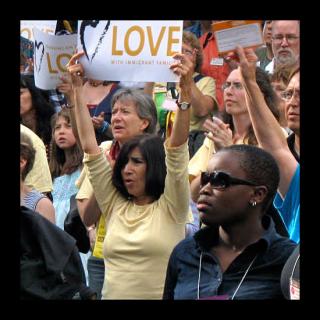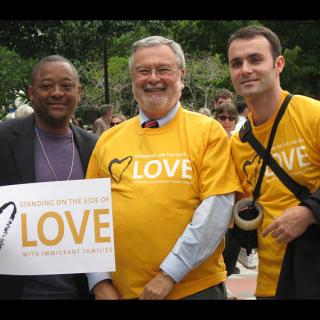Immigrant Families
General Assembly 2009 Event 3011
As members of the General Assembly marched from the plenary session to the outdoor Gallivan Center Plaza in downtown Salt Lake City, the choir from First Unitarian Universalist Church of Salt Lake City sang to representatives of local faith communities as they met their Unitarian Universalist peers in an interfaith witness to immigrant families and the injustices many of them face. Rev. Thomas Goldsmith of the First Unitarian Church of Salt Lake City welcomed the crowd of several hundred youth, children, adults and elders. It was promoted as an event to “Stand on the Side of Love,” and one of the event organizers said that today “very few groups need to know love and affirmation more than our immigrant neighbors.”
The market was brisk for logo posters, bracelets and bright yellow t-shirts bearing the message “Standing on the Side of Love.” This reporter wandered the plaza speaking with attendees. One, Pablo Quintana, a legal advocate and trainer in the local immigrant community, said that the presence of members of the “Anglo community” was heartening and a first in his experience. Mr. Quintana said that the rallies he has been at previously were attended mostly by the Latino/Latina community. Tony Yapias was moved to tears by the presence of “so many Anglos.” “It means a lot to us to have so many of you here,” Yapias, director of Proyecto Latino de Utah, said. Teenage siblings Smokey and Marco said that even though they had been born in the U.S. as children of immigrants they wanted to see an end to the “hating on Mexico.”
The first speaker, Bishop John C. Wester, bishop of the Catholic Diocese of Salt Lake City and chairman of the U.S. Conference of Catholic Bishops’ Committee on Migration, said Homeland Security workplace raids terrorize immigrant families, citing one which took place on December 12 of the past year. In that raid, children were separated from their families for days. In these raids, undocumented immigrants are denied due process of law, let alone compassion and care for their humanity. Rather than criminalizing them, the government should be in the business of protecting families, Bishop Wester said. He concluded his remarks with the prayer that SB81, a bill approved by the Utah legislature and taking effect almost immediately, “will not add to the fear and uncertainty of immigrant brothers and sisters in our midst.”
The Right Rev. Carolyn Irish, bishop of the Episcopal Diocese of Utah, works closely with the progressive community in justice and rights work. She maintains that all are hurt by the lack of due process and by the unconstitutionality of creating systems which deny rights. “It’s what our Constitution stands for.”
The third speaker, Rev. Pablo Ramos, canon for the Latino ministry in the Episcopal diocese of Utah, was encouraged by the interfaith gathering of Catholics, Episcopalians, Latter Day Saints and Unitarian Universalists. He believes that many lack profound knowledge of the issues facing immigrant families and individuals. He went on to describe financial implication of the raids, reducing household incomes when one parent stayed home to assure the children would not lose both parents to detainment or deportation. The reduction of income also has consequences in other countries, where money is no longer being sent to family members and finding its way into those economies. He said that this “issue has global consequences” and the work of the church must be engaged by all people. “We are all children of the same God.”
Mr. Larry Love of the Church of Jesus Christ of Latter Day Saints (LDS), known also as Mormons, told a personal story of his marriage to an undocumented immigrant. His wife has crossed into this country 16 years ago, pregnant and trying to attain political asylum. Although her three applications for legal residency were denied, she remained in the U.S. She was taken into custody, shackled and manacled and held by the Immigration Customs Enforcement agents. The family is still facing financial and legal challenges in their efforts to resolve the situation within the system. Mr. Love has become an activist leader, providing legal literacy training to the Spanish speaking community. He closed with a moving testimonial and a challenge to the assembled crowd to “get involved” with the legislative process and the ongoing education and advocacy efforts.
The Rev. Dr. William Sinkford, president of the Unitarian Universalist Association (UUA), spoke last, after being acknowledged for his leadership in the area of human rights. “As religious people we understand that this issue is financial, political and profoundly spiritual.” He too challenged the crowd to live their values, reminding them that the UUA has been involved in immigration concerns since 1961, and of the 2006 and 2007 actions of immediate witness, declaring that inherent worth and dignity are not just for some, but for all. Sinkford called on people everywhere to reject hate, to name injustice and adopt reforms, to press for the end of raids, to welcome and stand in solidarity with our neighbors and to be vigilant against the privilege which allows some to be invisible in our economy and society. For, he said, “the Statue of Liberty has always faced east—toward Europe, not south.” The rally ended with a rendition of “Standing on the Side of Love” sung by the choir and many members of the crowd.
This reporter also asked for post-event comments from people in attendance. Mary, an Episcopal priest, said “the way we handle this is important to our entire world. Something needs to be done and everyone needs to do something.” From Magalie: “As an immigrant, but one who is white and English speaking—it was easy for me. I’m here because it’s not fair that it should be so easy for me, and not for others.” Tim said “It’s about love and fairness.” And LDS member Shannon proudly wore a T-shirt proclaiming that “Immigration is the highest form of flattery.” She summarized her stance: “This is about people, not a series of laws and statutes. We need to support all families, and not tear apart the ones we consider…inconvenient.”
Reported by Rebecca Kelley-Morgan; edited by Jone Johnson Lewis.


